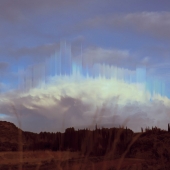
Elliott Matt
The End Of Days
Label: Ici D' Ailleurs
Genre: Rock / Pop
Availability
- LP €18.99 Dispatched within 5-10 working days
Other Formats
Elliott's accomplished Spanish guitar craft further add to the resemblance, particularly if followed by Cohen's final album.This is bleak but warm folk, embellished with gorgeous classical arrangements of composer David Chalmin, Gaspar Claus' cello, and bass of Jeff Hallam.
What is left when you are without words? What is left? Death, perhaps, but also life... What is left? A form of awe that dulls? An enthusiasm that dries up? A curiosity that no longer makes sense? A search that no longer finds its way?
Perhaps there is still the vision, the belief in what one sees, in what one guesses beyond.
We left Matt Elliott after a visionary Farewell To All We Know, not to say a harbinger of the collapsological crisis that was COVID 19. What can be built when everything is down, when everything has crumbled, ideals and beliefs, a sense of commonality and community? All that remains is to surpass oneself again and again, to dig again and again into the same obsessions, to tame them, to domesticate them. This ninth album by Matt Elliott under his own name, if we leave aside his more electronic side, Third Eye Foundation, is something of an evidence. There is in the British artist a creative expansion force that makes each record, especially since the beginning of his collaboration with the producer and multi-instrumentalist David Chalmin, a capacity to always surpass himself, to always surprise us through combinations that we thought we knew but that, each time, are new.
Of course, one would like to classify Matt Elliott in one genre or another, but more than a school or a style, the Englishman is finally more in line with a heritage, a tradition rather, that of the complaint, of the song of lamentation which runs from continent to continent, from country to country. From Greek rebetic songs to Portuguese Fado, Delta Blues, Balkan fanfares, Yiddish melancholy or Cape Verdean Saudade, you can hear it all in Matt Elliott's music, the song of an uprooted person, a stateless person, a being outside the world.
Where despair could be paroxysmal on The Broken Man (2011), it now dissolves into a delicacy like a trompe l'oeil. It leaves more room for silence, which is another form of expression of what could be summed up as sensitivity in its noblest form. To speak of oneself while forgetting oneself, to evoke oneself in what one is profoundly as if to better annihilate one's presence.
Matt Elliott comes to add a new element to his science of lamentation with the appearance of the saxophone used as you have never heard it. Forget John Coltrane, here it is not a question of virtuosity but more simply and more accurately of a contribution to the narrative of these ample songs, with a meticulous and patient construction. The End Of Days, in the opening, all in appeasement, in languor raises something remarkable in the Matt Elliott of 2022, it is this will to play with the Manichaeism in these songs neither only grey, nor totally black.
Matt Elliot sings this infinitely small space, this in-between between intense joy and absolute sorrow, this border between the unspeakable and the shared. Hence this feeling of nervousness, of urgency that runs through each of these compositions. January's Song reminds us how much Matt Elliott builds each of his records as a sequence of musical movements, there is something almost baroque in this second title, something of fin de siècle, something not so far from the formulas of a Santiago De Murcia. And then there are these titles that say it all like this Song Of Consolation or Healing A Wound Will Often Begin With A Bruise, maybe one of the most beautiful tracks of his discography. With him, we feel more and more this orchestral temptation, as if he was trying to reconcile his alias Third Eye Foundation to what he achieved in his solo career. Listening to Matt Elliott's records is not only listening to an artist who would have abandoned the electronic dimension in his work. It is much more than that, it is to see an artist who will leave a different imprint, Flowers For Bea is undoubtedly the most beautiful example. A bit like Dominique A who took years to take on the role of singer, Matt Elliott has chosen not to hide his voice behind production tricks. His voice has never been so beautiful, so strong, so full of nuances as on Unresolved. There is a kind of letting go in both his lyrics and his singing that is something new in the musician's work.
There is in Matt Elliott this force of expansion, this capacity to remove the dross, the parasites which disturb to keep only the essential, the emotion that is neither raw nor strong, no, the real emotion.
